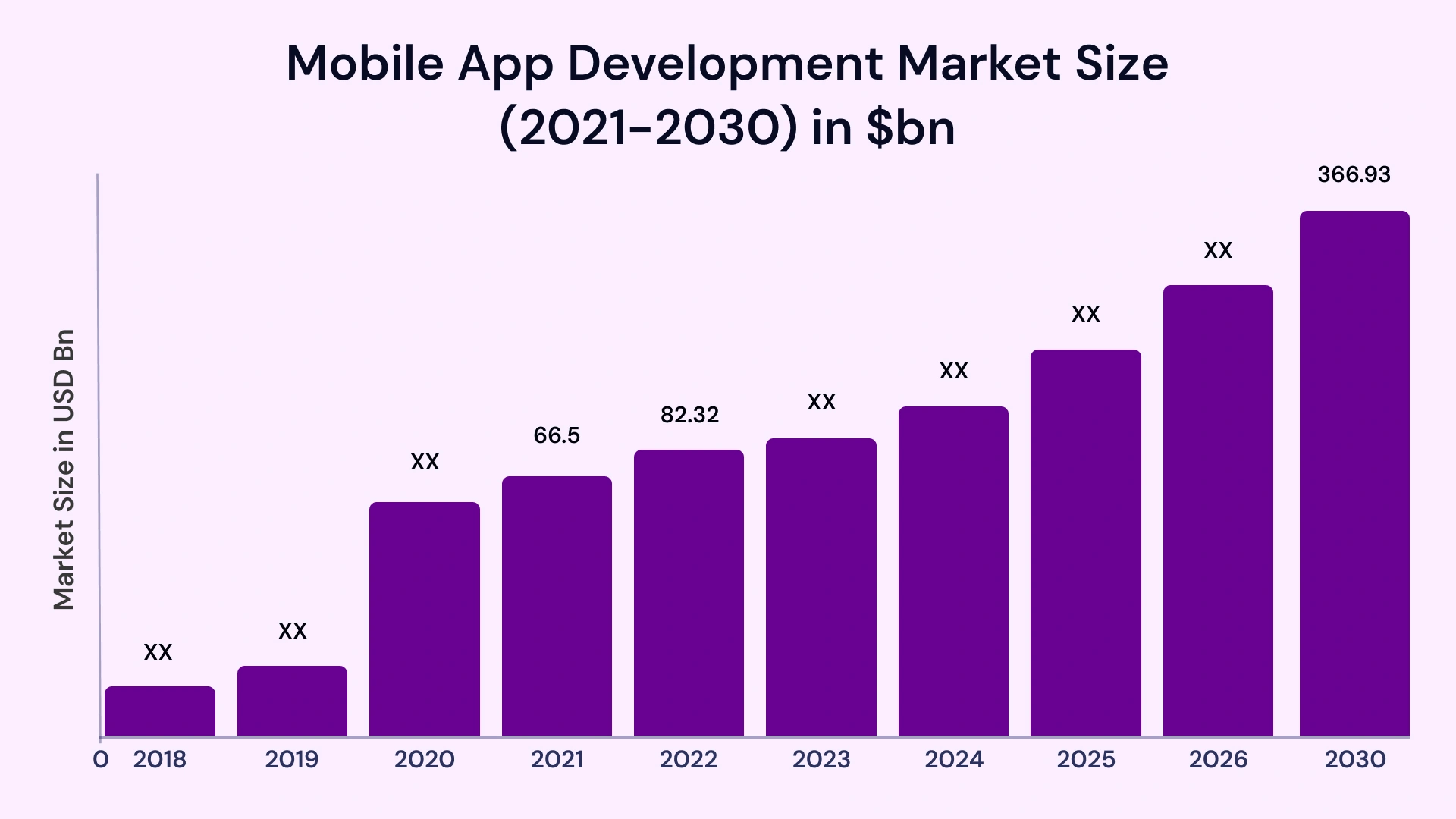What do enterprise companies want from their mobile app development? Finished software with reduced costs, delivered in the shortest period. However, plan the app development process carefully for a successful deployment.
Moving towards mobile platforms is an intelligent strategy that positions companies to maintain competitiveness in the contemporary market. The global mobile app market size was valued at $66.5 billion in 2021 and is predicted to reach a CAGR of 23.8% from 2022 to 2030, as shown in the figure below:

However, building an application for your business can be challenging without the right plan. A mobile app development project includes several tasks, processes and milestones. The following mobile app development checklist will help to create a competitive app for your business.
Let’s start with market stats:
Mobile App Development Market Stats
Mobile App Development Checklist
1. Discovery Phase
To assist others in understanding your concept, it's vital to provide a brief description of your app that expresses the main idea in straightforward terms. Start by generally outlining the app, then attempt to respond to some of the questions below:
- What does the app entail?
- What outcome do you want from your app?
- How will it function?
- How can it interest and benefit users?
2. Platform Selection
With a clearer understanding of the required features and insights into your target market's behaviors, the subsequent phase involves delving into the core aspects shaping your app. This stage establishes the foundational elements of your app, building upon the concepts and functionalities you've identified.
- Will your app work on Android?
- Is your app for iOS? And what is the cost to build an iOS app?
- Will you make an app for both now and wait to see its performance?
- Is the app native or hybrid?
- Will your app be integrated with the device’s features?
- Will it need cloud-based infrastructure?
3. UI/UX Design
The UI/UX design process includes several components such as branding, usability, and functionality. This phase signifies the transformation from a mere idea to a tangible product. The design of the application should be aligned with its intended purpose.
Users promptly dismiss applications lacking a seamless interface. So, ensure your app’s design is simple, user-friendly and practical functional. The UI/UX design covers visual components such as the arrangement of navigation elements, buttons, text presentation, icons, colour schemes, and more.
Notably, the design approach can vary based on the application's platform, whether it's Android or iOS.
User Interface (UI)
App’s user interface design grabs the most attention from users. A seamless user interface is a prerequisite for the app's triumph. Designing the UI involves taking several factors into account, including:
- Application Orientation: Choosing between portrait and landscape orientation for the app.
- Smooth Orientation Transition: Ensuring effortless switching between different orientations.
- Incorporating Wireframe Design: Utilizing a wireframe design approach for the application's layout.
App Prototype
Within this phase, the primary step involves crafting a prototype for the designated application.
The app development team is responsible for handling this task, considering factors including the app's objective, budget, project timeline, Tech stacks, and UI requirements.
The prototype serves the purpose of demonstrating the operational dynamics of the app. It can be achieved through initial sketches or advanced wireframes, which offer enhanced visual representations.
- Do you have the wireframe ready?
- Have you decided on the App orientation? Landscape or Portrait?
- Does the app easily transition from one orientation to another?
- Have you finalized your benchmarks?
- Have you worked on the transition between screens?
- Are the call-to-action buttons standing out from other elements?
4. Development Criteria
It’s an essential part of mobile app development services. This stage involves coding for the application upon which the app’s front-end and back-end programs take place. The app design depends on agile methodology for better application output.
The application's design must be adept at managing incoming data streams. Since coding represents the most intricate aspect, this juncture is ideal for determining whether to proceed with in-house app development or enlist a mobile app development company.
The coding process includes several technologies such as Android NDK, JAVA, Swift, React Native, and Iconic to turn your dream app into reality.
- Are you making the app in-house?
- Are you hiring an experienced app development company?
- Should you hire a company based in your region or internationally?
- Do you have a team and expertise for in-house app development?
- What is the cost to build a mobile app?
- How much time would it take to build the app?
- Have you settled on the development process? Iterative, Agile or Waterfall
- How to build a successful iPhone app?
5. Performance Metrics
After deciding whether to build an app in-house or hire IT staff augmentation services, creating a checklist to measure its performance metrics is essential.
Here are some questions you need to ask:
- Does the app have a web service?
- Is your app’s scope scalable vertically or horizontally?
- Do you get notifications of app crashes in real time?
6. Adding Security Features
A security feature in the design is as essential as the app’s development phase. At the initial stage, adding security might be costly. In the long run, a lack of security in the app will lead to serious cyber threats and, ultimately, loss of reputation. So, it’s essential to implement security protocols and practices to avoid the possibility of a data breach.
Also Learn: The importance of cybersecurity in the age of IoT.
Here are some queries you need to ask:
- Do you have a secure socket layer incorporated in the project?
- Does your app have two-point user authentication in place?
- Do you have control over who would have access to your app?
- Will there be sub-admins?
- Is your payment gateway integration done right?
7. Testing Checklist
Before launching an app in the market, it must be released in the testing phase. It will help you identify software’s functional flaws and design bugs in real time.
QA software & testing services include testing with fake cyber threats to check the app’s security. The API testing procedure and tools can test the app's functionality, reliability, performance and security.
Here are some questions you need to ask:
- Is your app performing the same on different devices and OS versions?
- Have you checked your mobile app Localization strategy?
- Is your app ready for the following device update?
- Do you have a test plan with tests like QC, Unit, and User Acceptance Testing?
8. Solid Marketing Plan
At the core of the app development checklist, a well-defined marketing strategy stands as the pivotal point. Marketing serves as the conduit through which users become acquainted with the app, concurrently allowing companies to capitalize on their creations. Introducing an app devoid of a robust marketing plan results in failure.
Here are some questions you need to ask for bolstering the app's popularity and profitability:
Leveraging social media: Harnessing the power of social media platforms for app promotion enables broader outreach to the intended audience.
Integration with social media: Where feasible, integrating social media platforms directly into the app facilitates effortless sharing across diverse social networks.
Incorporating In-App Purchases: Monetization strategies can involve introducing in-app purchases enticing users to pay for accessing supplementary features within the app.
Exploring additional monetization avenues: Depending on the app's purpose, various monetization avenues, such as subscription services, in-app advertisements, paid downloads, etc., can be considered.
A comprehensive marketing approach fuels awareness and engagement while fostering avenues for generating revenue from the app's functionalities.
9. Branding Requirements
This point would define your brand impression and attract an audience to download your app among thousands of other apps. Here are a few things that should be perfect in your software before launching it in the Apple or Google Play Store.
- Are your App images clear and contextually suitable?
- Is your App Store Optimization done right? (More on this here)
- Have you added actual screenshots in the app description?
10. Deployment and Maintenance
It’s the final but most important point for a successful mobile app development checklist, as it’s for real-time user experience. The software maintenance and support services requires regular app testing even after deployment to modify the app if any crashes happen. Ensure you update your software regularly for better compatibility with the devices’ operating system.
Consider VLink as Your Mobile App Development Partner
This checklist will help you create successful mobile app development for your business. With a comprehensive plan, you can move through the process efficiently, minimizing potential time loss and wasted resources.
At VLink, we understand the importance of implementing enterprise mobile apps as a part of corporate strategy. Our platform empowers businesses to build native cross-platform apps for various business functions.
To find out what VLink can do for your business, contact us!










 Shivisha Patel
Shivisha Patel

















